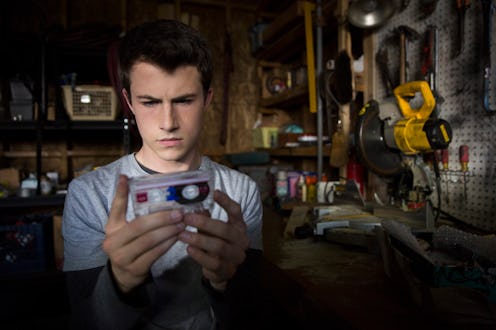
In the new Netflix series 13 Reasons Why, based on a YA novel by author Jay Asher, the story begins when a life ends. High school student Hannah Baker has committed suicide, and instead of a note, she has left a series of audio tapes behind — 13 of them, to be exact, each one addressed to a person who helped contribute to her decision to take her own life. We hear the tapes through the perspective of Clay Jensen, a classmate who had a crush on Hannah and finds that one of the tapes is devoted to him. As he listens to Hannah's tragic legacy, the mystery of why she took such a drastic action is finally solved. So who gets the last tape in 13 Reasons Why? What was the final straw for Hannah Baker?
The first dozen tapes are all devoted to various classmates of Hannah's, other students at her high school who helped make her life unbearable in some way. Some of these reasons are small and seemingly insignificant to an outside observer: taking her picture unasked, sharing her private poetry, making up rumors about her. Of course, some of the reasons are much bigger: a best friend who betrayed her, a fatal accident, a sexual assault. But nothing prepares Clay — or the audience — for Hannah's final reason.
After 12 tapes involving the petty cruelties and callous violence of children, it's jarring to find the thirteenth and final tape devoted to an adult: Mr. Porter, a teacher at Hannah's school who also works as the guidance counselor. The realization that an adult could have had a hand in Hannah's death, however indirectly, is distressing to Clay. As he says in the book:
"No! He cannot know about this. Hannah and I both have Mr. Porter for first-period English. I see him every day. I do not want him to know about this. Not about me. Not about anyone. To bring an adult into this, someone from school, is beyond what I imagined."
Hannah recorded a session she had with Mr. Porter; but before she did, she made it clear that this was her final attempt at finding a reason to live. "I'm giving life one more chance," Hannah said into the recorder in Asher's novel. "And this time, I'm getting help. I'm asking for help because I cannot do this alone." Of course, since Clay is listening to the tape, we already know that Mr. Porter must have failed to provide the help that Hannah needed. But that doesn't make listening to their conversation any easier.
In the book, Hannah quickly makes her feelings clear to Mr. Porter by making a veiled threat of suicide: "I need everything to stop. People. Life." When he asks her where this is coming from, she alludes to a nonconsensual sexual encounter she had with another student. But when Hannah balks at the idea of taking legal action or otherwise facing her attacker, Mr. Porter tells her that she only has one other option: "I'm not trying to be blunt here, Hannah, but you can move on." She tells Mr. Porter that the boy in question is a senior, so Mr. Porter says that he'll be gone in a year anyway.
"Look, something happened, Hannah. I believe you. But if you won't press charges and you won't confront him, you need to consider the possibility of moving beyond this."
As we know, Hannah unfortunately won't move beyond it — and Mr. Porter's inept handling of such a sensitive moment is a large part of the reason why.
This scene is crucial for a number of reasons. First of all, it highlights the wrongheaded response to sexual assault that so many victims encounter; just because Hannah was scared to face her attacker doesn't mean she was ready to move on from such a traumatic event. It also highlights the similarly wrongheaded response many people face when suffering from depression; depression is a mental illness, and it's not something that will go away if you tell someone to "get over it." Furthermore, while most of the story is devoted to the cruelty of children, this scene highlights the fact that cruelty doesn't always look like cruelty — and that such accidental cruelty can just as easily come from adults who claim to know better.
Finally, and perhaps most importantly, Hannah's meeting with Mr. Porter highlights the fact that we can never truly know how our words will affect someone else. You may not know when you're talking to someone who just underwent a traumatic experience, or someone who who is suffering from an illness, or someone who is just looking for a reason to go on living another day.
Even people with the best of intentions can fail sometimes; Mr. Porter isn't painted as a villain in this story, he's simply a teacher who failed to hear a cry for help. But just because we might mess up sometimes doesn't mean we shouldn't always try our hardest to treat each other with compassion, empathy, and respect. That's a crucial lesson to impart, especially given the increasingly deep divisions and apparent lack of understanding within our own society — and that's what makes 13 Reasons Why such an important show.